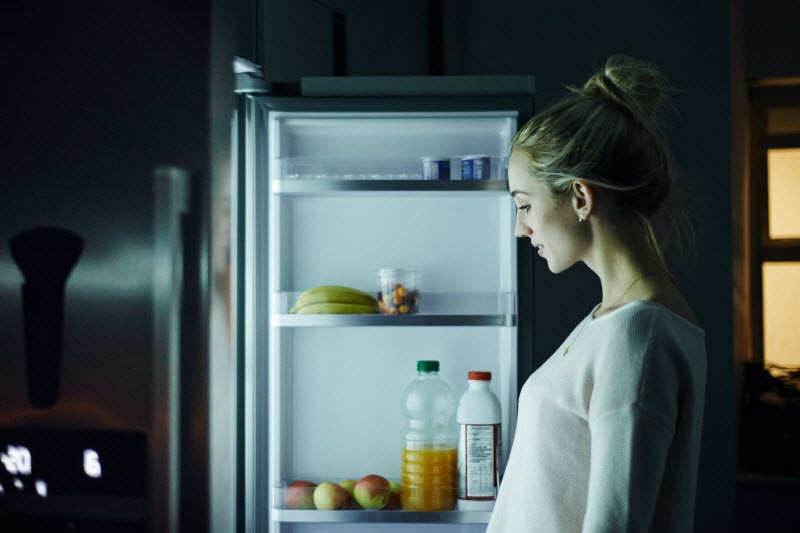Believe it or not, we’re all guilty of slipping up with our healthy diets. When a late-night nachos or cake craving kicks in, sometimes we’ve just got to give in. With food delivery apps, midnight specials and TV ads making irresistible food easily accessible and top of mind, it can be hard to roll over, go to sleep and wait until morning to eat.
But have you considered how eating in the p.m. hours affects your body, beyond contributing to a potentially expanded waistline?
According to the research published in the Journal of Clinical Sleep Medicine, eating before bed is linked to sleep issues. Researchers found that food intake near the sleeping period (dinner and late-night snacking) exerted “a negative influence on sleep quality.”
Although the study was small and more research in this areas is needed, it’s safe to say you might want to consider regulating your diet after dark. Let’s take a closer look at some ways eating before bed can affect your sleep – and what you can do about it.
How eating affects sleep
For more restful sleep, it’s a good idea to avoid consuming excess food close to bedtime. While it’s commonly believed that hunger disrupts sleep, going to bed with a full stomach isn’t ideal either. In fact, it can interfere with sound sleep in numerous ways. Consider heartburn, for example. People who suffer from gastroesophageal reflux disease (GERD) or other digestive issues may experience heartburn, coughing or even vomiting. Blood sugar levels also can spike, making it hard for your body to sink into restorative sleep.
The metabolism connection
How food affects your body depends on your metabolism – and, remember, everyone’s metabolism is different. As a general rule, experts recommend the average person stop eating 2 to 3 hours before bedtime. This allows your digestive system ample time to break down and digest the food before your body shuts down for sleep.
Effects of late-night eating on weight
According to a 2018 review published in Physiology & Behavior, the timing of food consumption before bedtime can affect weight and metabolic function. It’s been shown to contribute to metabolic dysfunction, decreasing fat oxidation and disrupting nutrient absorption. One of the major contributing factors is late-night snacking on high salt and sugar processed foods. Snacks such as crackers, chips, pretzels and cookies should be avoided especially before bedtime.
An ideal nighttime snack
Timing isn’t the only factor in sleep disturbances. What you eat matters, too. Not only should you finish your last nibblings of the day at a set time, but be careful about what – and how much – you consume. For an average stomach, an ideal nighttime snack is smaller in portion size, milder in taste, lower in fat content and fiber, and it should be eaten at least 2 to 3 hours before bedtime.
Digestion and quality of sleep
One notable thing that happens if you eat too close to bedtime is that your digestive system slows down. As a result, if you hit the hay with a considerably fuller stomach, you’re more likely to experience indigestion, causing you feel uncomfortable throughout the night. Eating late at night also interferes with the production of human growth hormone that’s secreted at night when your body enters deep slumber mode. In addition, it disrupts melatonin levels that are essential for quality sleep.
What nutrients to avoid and include
While many nutrients are crucial for health, some – such as fiber – should be avoided before sleep. For instance, if vegetables like Brussels sprout and broccoli are a part of your diet, then they should be consumed for lunch instead of dinner. Similarly, any beans or high spicy food should be avoided. Instead, try incorporating high-quality fat and protein foods like avocados or salmon, complex carbohydrates such as whole-grain bread, plain oats and barley, and starchy vegetables such as sweet potatoes into your evening meals.
Watch your water intake
Lastly, as much as staying hydrated is important, chugging a bunch of water before bed is not the way to go. Remember that water is also filled with essential nutrients and minerals that need to be absorbed by the body. While it can take a long time to digest food, water passes through the digestive system more quickly. You don’t want to spend the night waking up to use the bathroom, so stop drinking liquids a few hours before sleep.

